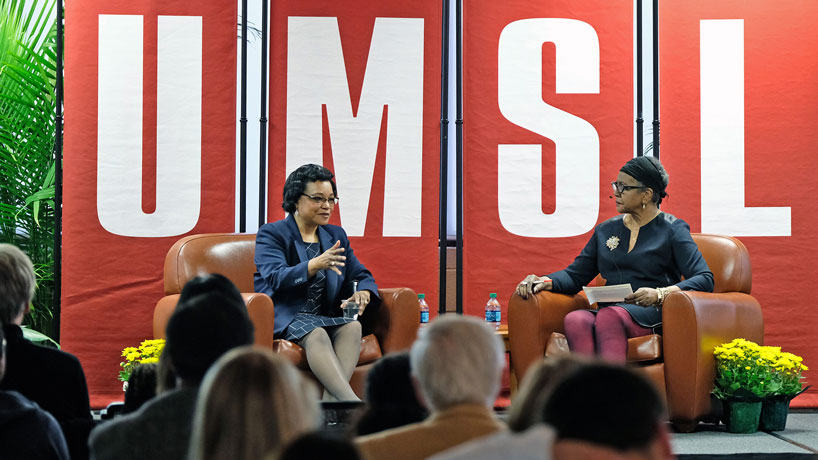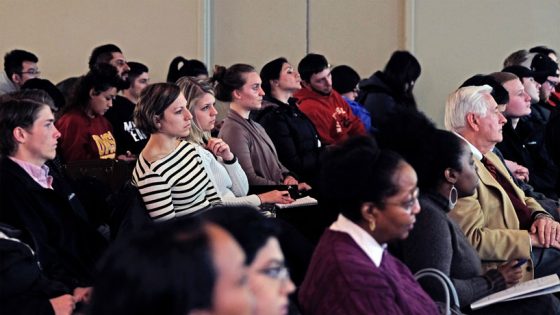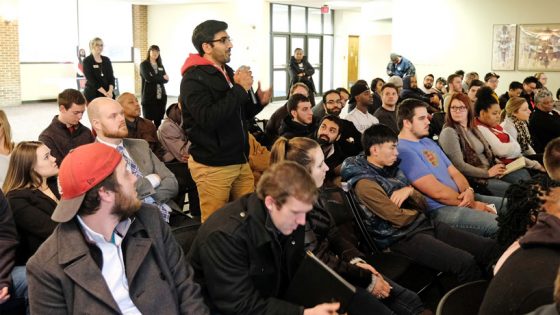
Emerson Vice President of Technology Pamela Jackson answers a question Tuesday night during the Distinguished Speaker Series. Executive Leadership Consortium Director Malaika Horne (at right) helped organize the event, coordinated by the consortium and the College of Business Administration at UMSL. (Photos by August Jennewein)
An African American woman with roots in a western Pennsylvania steel mill community, Pamela Jackson’s climb to vice president of technology at Emerson in St. Louis is exciting and awe-inspiring.
It rang out to an audience of 175 students, faculty members and community attendees at the University of Missouri–St. Louis Tuesday night in a well-timed speech, coming in the midst of Women’s History Month and on the heels of February’s Black History Month.
Her address, “Women in STEM Careers: Bridging the Gender Gap to Foster Innovation and Competitiveness” was the most recent in the Distinguished Speaker Series, which happened in the J.C. Penney Building and Conference Center.

About 175 students, faculty and community members attended the address and discussion in the J.C. Penney Building and Conference Center.
Hoping to inspire more women and minorities to pursue a path similar to hers, Jackson started with her first steps, which included a solid public education, an inspirational 7th-grade teacher and science competitions that had her researching and presenting projects at the national level.
Her paper for the Westinghouse Science Talent Search earned her national recognition and helped her get into the Massachusetts Institute of Technology, where she earned her bachelor’s and master’s degrees in chemistry. Jackson also holds an executive MBA from Boston University.
“I discovered early on in college that being a female and being an African American studying chemical engineering – that was something different and special,” Jackson said. “It was not easy. It was certainly not always comfortable, but it was consistently special, and it’s been that way throughout my career.”
Science, technology, engineering and math are “the key building blocks for many of the advances we enjoy in our lives today,” Jackson said.
She also said that those advances are driving the need for a more technical and skilled workforce, noting that STEM jobs are growing at 1.7 times the rate of non-STEM jobs.
“We need to ensure, young people are getting a good foundation in STEM basics during their education,” she said. “Experts say 2.4 million STEM job openings will go unfilled in this country by 2020. China, India and other countries are gearing up to provide more STEM professionals. The U.S. is lagging behind.”
Foreign students will fill the gaps in the U.S. STEM industries.
“They’re not taking our jobs,” Jackson said. “We just do not have enough skilled American kids to fill the openings.”
The solution? Jackson suggested that the U.S. needs to start firing on all cylinders and should actively encourage and pursue women and minorities to consider STEM careers.
“They are the largest untapped pools of U.S.-based STEM talent,” Jackson said. “Forty-three percent of U.S. children are of Hispanic, African American or Native American decent. But minority students earn less than 15 percent of STEM college degrees.”

An information systems student asks Jackson about how he, as a man in a STEM field, can help promote women empowerment and equal representation within his area. “First, support the females that you already have and make sure the work environment is comfortable for them,” Jackson responded. She also stressed offering women equal assignments to those the men receive and stepping in to fix moments of inequality when witness to them.
Those numbers are frightfully low for Jackson.
“Brains are not handed out by gender,” she said.“They are not handed out by race, so we have a capable pool of people that just need to have the opportunity and the experiences in STEM.”
Hearing these words was important for MBA finance student Ohoud Alruwaili, who is the first woman in her family to come to the states and pursue a degree here.
“I can relate. I had to push and fight for this opportunity,” Alruwaili said.“Hearing what she had to say makes me really reflect and think about all the data and the reality of the market.”
Jackson ended her address with five positive, actionable items to help drive the movement to bridge the gender and minority gaps.
- Become more self-informed and don’t be intimidated. “Read, read, read,” she said.
- Promote STEM to women and minorities.
- Be aware of your own biases and then correct them.
- Connect the arts to STEM because “science, technology, engineering and math alone do not advance a society.”
- Help bring more resources to the cause.
Emerson and UMSL are doing their parts to lead the way in increasing STEM opportunities and help graduate skilled STEM professionals. Emerson is donating $300,000 a year for five years to the Opportunity Scholars Program to support STEM education. The effort has already begun to see success.
As Emerson’s vice president of technology, Jackson leads numerous development initiatives for the global manufacturing and technology company. Along with managing technology development, she oversees new and lean product development, portfolio and product life cycle management and Emerson’s centers of excellence for software and human-centered design.
Jackson was recently named to the Business Journal National List of 100 Women to Watch and was one of the St. Louis Business Journal’s 2016 Most Influential Business Women. She has also received the 2016 Achievement Award from the St. Louis Society of Women Engineers Chapter and is a recipient of the New York City YWCA Salute to Women Achievers Award and the National Black Engineer of the Year Dean’s Award.
The Distinguished Speaker Series is coordinated by the UMSL Executive Leadership Consortium in the College of Business Administration, which aims to expose students to career professionals with the hopes of preparing future graduates to become effective leaders in the region and beyond.
Cosponsors for the event are UMSL College of Business Administration, E. Desmond Lee Professor in Developing Women & Entrepreneurs in International Business, Executive Leadership Consortium and Gender Studies.















